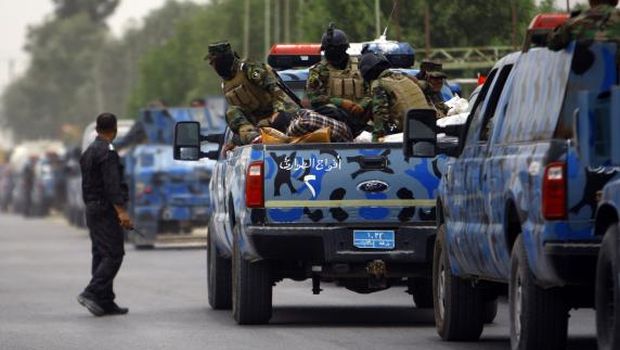
Iraqi soldiers gather as their unit is shipped north from the central Shi’a Muslim shrine city of Najaf to Mosul following the increased violence, on June 8, 2014. (AFP Photo/Haidar Hamdani)
Baghdad, Asharq Al-Awsat—Iraqi politicians have called on Baghdad to change tactics in its attempts to recapture districts of the city of Mosul from the Islamic State of Iraq and Syria (ISIS).
Iraqi parliamentary speaker Osama Al-Nujaifi, the leader of the Sunni Arab Muthidoun bloc in parliament, issued a statement on Sunday calling on the government to avoid “the use of indiscriminate bombardment, especially by mortars, or the use of the Air Force, all of which cause heavy losses,” and to do more to cooperate with local authorities.
Instead of bringing heavy weapons to bear, Nujaifi urged the government to use its best troops and “increase the reliance on intelligence by cooperating with the residents of Mosul.”
ISIS launched a multi-pronged attack across Iraq at the end of last week and over the weekend, striking at the campus of Anbar University in Ramadi and the city of Samarra, as well as attempting to seize districts of the city of Mosul in northern Iraq.
Dozens of militants, civilians and security force personnel have been reported killed in the past few days.
In Samarra, some reports say that security forces responded with indiscriminate bombardment following the ISIS attack on the area, which included an attempt to storm the Al-Askari shrine before being forced to withdraw.
Nujaifi added: “The cooperation of the armed forces with the residents should bolster the joint efforts to confront terrorism together and strengthen the ability of the security forces in the governorate. The cooperation with the local administration, especially the governor of Nineveh in his role as the head of the governorate’s security committee, should help avoid the suffering and the tragedies which took place in Ramadi and Fallujah.”
The Nineveh Governorate Council echoed Nujaifi’s comments, and called on the Iraqi Army’s Nineveh Operations Command to end the bombardment of Mosul districts.
A member of the council, Hussam Al-Din Al-Abbar, said on Sunday: “The council demanded that the Nineveh Operations Command end the bombardment of the western districts of Mosul and allow residents to leave their homes and help them reach safe areas.”
Abbar added: “The council demanded that the command lifts the curfew—even if only partially—on the eastern part of the city of Mosul to allow families to get supplies.”
He also called for the “establishment of a crisis cell by the governorate of Nineveh to provide humanitarian aid for the residents of Mosul, especially the displaced families.”
Meanwhile, an Iraqi strategic analyst, speaking to Asharq Al-Awsat on condition of anonymity, said: “The method used by the security forces and the army in regards to indiscriminate bombardment which has resulted in dozens being killed and hundreds being displaced, is a method which ISIS lured the security forces into.”
He added: “ISIS and Al-Qaeda have nothing to lose in their actions except lose the odd foothold, similar to the events in Fallujah, while they distract the security forces and cause a wave of hatred among the residents.”
The analyst also warned that the wave of ISIS attacks has led to poor morale among military personnel, further undermining government efforts to tackle the security crisis.
The current wave of violence began at the end of last year, when Sunni residents of Anbar province, angered at what they said was sectarian discrimination on the part of the federal government, expelled police and army units from the cities of Ramadi and Fallujah in the western province.
The insurgents were joined by members of jihadist groups, including ISIS, who have used the territory to mount increasingly violent and ambitious attacks against targets in Baghdad and elsewhere.
Since then, government troops backed by pro-government tribal militias have attempted to retake control of Anbar, but have faced stiff resistance from ISIS and other groups.
